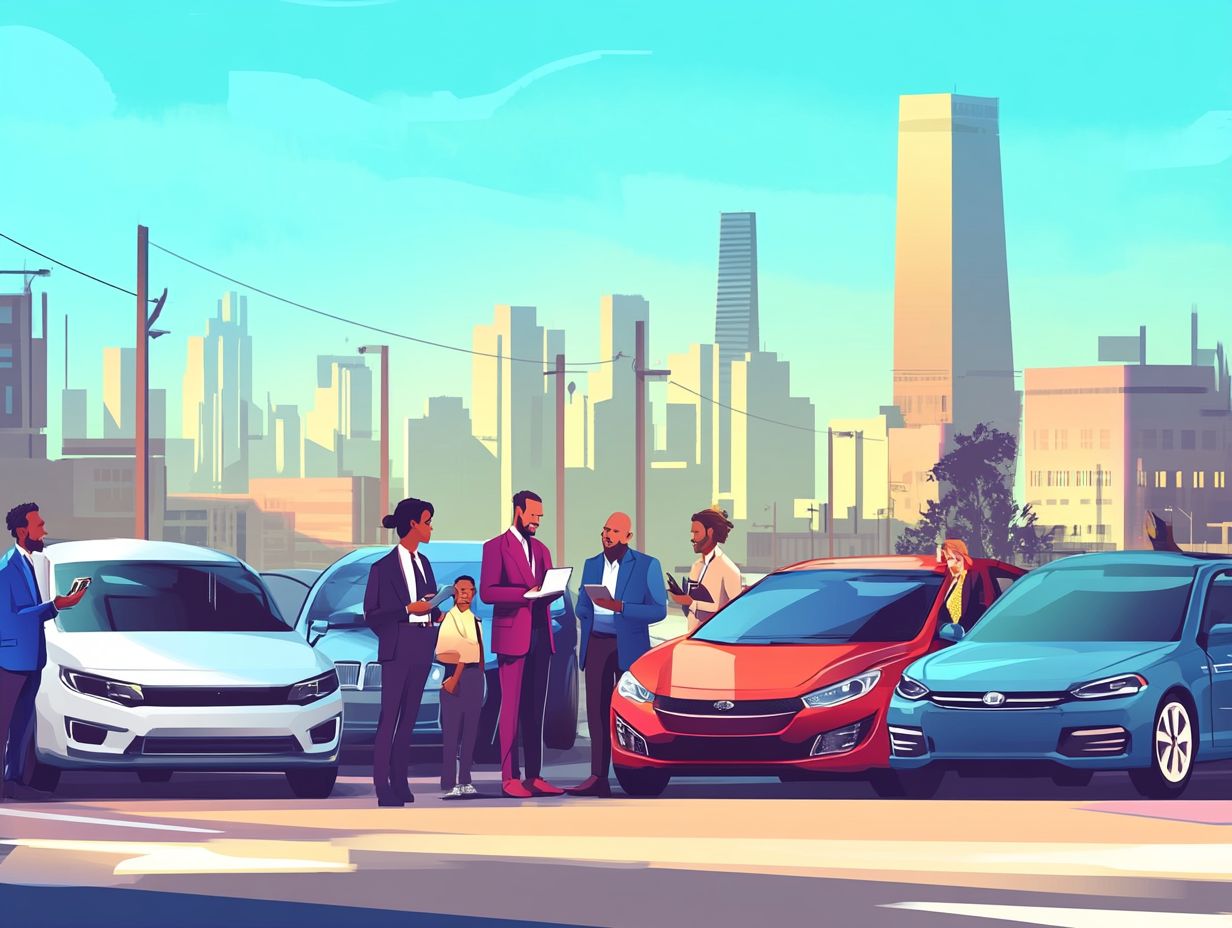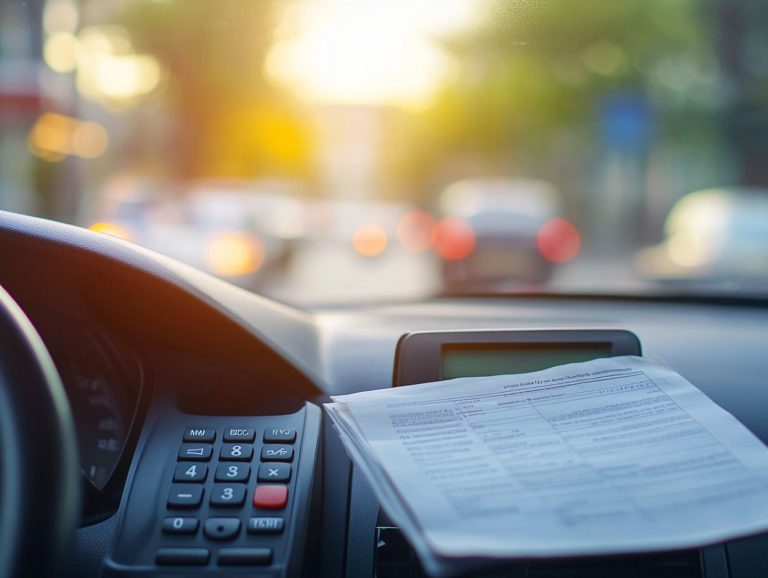Understanding Coverage for Ride-Sharing Vehicles
Ride-sharing services like Uber and Lyft have changed how we get around. They offer incredible convenience and flexibility for both drivers and passengers.
However, this change comes with unique challenges, especially regarding insurance coverage. Without the right protection, you and your passengers face serious risks.
In this article, you’ll discover the types of ride-sharing services available and why having adequate insurance is so important. Understanding your insurance needs is essential for a safe journey on the road.
Contents
- Key Takeaways:
- Importance of Insurance Coverage
- Insurance Options for Rideshare Drivers
- Coverage Options for Ride-Sharing Drivers
- How to Choose the Right Coverage
- Frequently Asked Questions
- What is ride-sharing and why is coverage important for these vehicles?
- Are ride-sharing vehicles covered by personal auto insurance?
- What kind of coverage do I need as a ride-sharing driver?
- Does my ride-sharing company provide insurance coverage?
- What happens if I don’t have adequate coverage as a ride-sharing driver?
- Are there any specific insurance requirements for ride-sharing vehicles?
Key Takeaways:

- Adequate insurance coverage is crucial for ride-sharing drivers to protect themselves, passengers, and other drivers on the road. Not having enough coverage can lead to financial and legal troubles.
- There are two types of insurance options for ride-sharing vehicles: personal auto insurance and commercial auto insurance. It is important to understand the differences and choose the right coverage based on your needs.
- When choosing coverage for ride-sharing vehicles, consider factors like coverage limits, deductibles, and additional endorsements. Being properly insured as a ride-sharing driver is a smart financial decision and a legal requirement.
Definition and Types of Ride-Sharing Services
Ride-sharing services such as Uber and Lyft have transformed travel and delivery experiences by providing flexible choices through user-friendly app platforms. These services connect you with drivers or delivery options, allowing you to earn income while fulfilling essential transportation needs.
The rise of delivery services like DoorDash and Grubhub has enriched the ride-sharing industry, creating a varied industry that caters to your diverse consumer demands.
This innovation lets you summon a vehicle with just a tap, changing traditional transportation methods and dramatically reducing wait times. Drivers can optimize their schedules and select their working hours, leading to increased job satisfaction and financial freedom.
The app-based design of these services simplifies the ride-booking process while enhancing safety measures by providing real-time tracking and driver reviews. As you rely on these platforms for daily errands, the demand for various services ranging from shared rides to food deliveries grows, reshaping urban mobility and connectivity in exciting ways.
Importance of Insurance Coverage
Insurance coverage is essential for ride-share drivers, providing a financial safety net and helping meet requirements set by companies like Uber and Lyft. To ensure you have the right protection, it’s important to understand coverage for unconventional vehicles. Without the right rideshare insurance, you could face significant issues that leave you vulnerable in an accident.
It s crucial to understand the various insurance options available, including personal auto insurance and specialized rideshare coverage. This knowledge is key to ensuring your security and peace of mind while on the road.
Risks of Not Having Adequate Coverage
The risks you face as a rideshare driver without adequate insurance coverage can be severe. Without proper insurance, you could face financial turmoil and legal headaches.
Relying solely on personal auto insurance may leave you exposed to coverage gaps, especially if you get into an accident with drivers who do not have insurance. This situation could complicate claims and drive up your accident coverage costs.
These gaps not only put your safety at risk but also expose your passengers to significant dangers, heightening liability concerns. When an accident occurs, the financial burden can impact not just your wallet but also your driving reputation.
Without the right coverage, you might find yourself entangled in legal battles that could escalate quickly into overwhelming expenses. Don t wait! You need to invest in comprehensive rideshare insurance that fills in the gaps traditional policies cannot.
By securing robust coverage, you can enjoy peace of mind while on the job, safeguarding yourself and your passengers from unexpected incidents.

You ll find a variety of insurance options tailored specifically for rideshare vehicles. Each option is designed to meet the unique needs of drivers in part-time driving jobs.
The most prevalent choices include personal auto insurance, which usually covers private use, and a commercial auto policy, crafted for vehicles primarily used for business.
Adding rideshare endorsements to personal policies can effectively fill coverage gaps and satisfy the requirements imposed by rideshare companies like Uber and Lyft. This add-on provides extra protection for your rideshare driving.
This ensures that you have robust protection while navigating the roads.
Personal Auto Insurance
Personal auto insurance covers your vehicle for private use. It provides liability coverage and financial protection. However, many of these policies have limitations for rideshare driving.
This is where a rideshare endorsement becomes essential. It expands your coverage limits and addresses the specific risks tied to driving for rideshare companies.
This endorsement is vital because standard policies often fall short in providing adequate protection during rideshare activities. By incorporating this coverage, you can ensure that you re safeguarded against potential liabilities.
It’s important to note that opting for a rideshare endorsement may lead to increased insurance premiums, reflecting the higher risk factors involved. Evaluate the benefits and limitations of these modifications to make informed decisions about your insurance needs.
Ultimately, this can lead to enhanced protection on the road.
Commercial Auto Insurance
Commercial auto insurance is tailored specifically for vehicles used in business activities, including ride-sharing services. This specialized policy offers comprehensive liability coverage, safeguarding you from financial losses due to accidents.
If you’re frequently driving for rideshare companies like Uber and Lyft, understanding coverage for commercial use of personal vehicles is highly advisable. In addition to liability protection, this insurance typically covers you against uninsured motorists, an essential safeguard given the unpredictable nature of rideshare driving.
Unlike personal auto insurance, which is geared toward private use, commercial auto insurance recognizes the unique risks that come with providing transport services.
It s vital to understand that personal auto insurance often excludes coverage for incidents occurring during commercial purposes. If you re regularly accepting fare-paying passengers, opting for a commercial policy helps you meet industry requirements and gives you peace of mind while navigating the roads.
Coverage Options for Ride-Sharing Drivers
As a rideshare driver, you have many coverage options to stay fully protected while driving. Rideshare coverage goes beyond standard personal auto insurance, usually including higher liability limits and comprehensive coverage tailored to your unique risks. To learn more about your options, check out this guide on understanding coverage for transportation companies.
Familiarize yourself with the insurance requirements from platforms like Uber and Lyft. This will help you choose the best coverage for your needs.
What is Covered and What is Not

Understanding your coverage is crucial as a rideshare driver. For comprehensive insights, refer to understanding coverage for specialty vehicles, as rideshare policies typically cover liability and accident damages when you’re transporting passengers.
However, these policies often don t cover personal use during non-ride-sharing hours. Review your policy s coverage details carefully to avoid financial surprises.
Many policies may exclude scenarios like driver negligence or accidents with uninsured motorists. Keep an eye on the limits and deductibles, as they vary widely between policies.
Thoroughly examine your policy documents. Discuss any questions with an insurance agent to catch important details.
With comprehensive coverage for both rideshare activities and personal use, you can enjoy peace of mind.
How to Choose the Right Coverage
Selecting the right insurance as a rideshare driver requires careful thought. Evaluate the options in your area and compare rates from different providers.
Getting an insurance quote helps you find the best policies while meeting the coverage requirements set by companies like Uber and Lyft.
Factors to Consider
Consider several critical factors that impact your protection and costs. Your driving history, desired coverage limits, and the need for additional rideshare coverage are all important.
Your driving record can influence your premiums; better records often lead to lower rates. Choosing higher limits offers more security but can raise your premium.
You must also understand the additional coverage required by your state, as this can affect your policy’s suitability for rideshare services.
Weighing these factors empowers you to make informed decisions and ensures you’re protected during rideshare activities.
Importance of Being Properly Insured as a Ride-Sharing Driver
Being properly insured as a ride-sharing driver is crucial for meeting the insurance requirements set by rideshare companies and ensuring you have the financial protection you need. Additionally, it shields you against potential liabilities, including uninsured motorists. Without the right coverage, you could face severe financial repercussions in the event of an accident, which might significantly affect your rideshare business and overall financial stability.
Navigating the legal landscape can be particularly intimidating, as accidents involving ride-sharing vehicles often raise complex liability questions. Inadequate insurance can leave you exposed to serious legal consequences, especially if disputes arise with other parties involved. The risks of sharing the road with uninsured motorists cannot be overlooked; collisions can lead to costly repairs, medical expenses, and potential lawsuits.
By investing in comprehensive insurance, you can drive with peace of mind, knowing you’re safeguarded against unforeseen challenges. This keeps you safe from accidents and other unexpected events, allowing you to focus on your rideshare endeavors without the nagging worry of financial catastrophe looming over you. Don’t wait until it s too late!
Frequently Asked Questions

What is ride-sharing and why is coverage important for these vehicles?
Ride-sharing refers to the use of a personal vehicle for providing transportation services to paying passengers. Understanding coverage for car sharing programs is important for these vehicles because personal auto insurance typically does not cover commercial activities, leaving ride-sharing drivers vulnerable to potential liabilities.
Are ride-sharing vehicles covered by personal auto insurance?
No, personal auto insurance policies usually exclude coverage for commercial activities such as ride-sharing. This means that ride-sharing drivers need additional coverage, including understanding coverage for uninsured vehicles, to protect themselves and their passengers.
What kind of coverage do I need as a ride-sharing driver?
As a ride-sharing driver, you will need an insurance policy specifically for vehicles used for business purposes that includes coverage for carpooling. This keeps you safe from accidents and other unexpected events while driving for a ride-sharing company.
Does my ride-sharing company provide insurance coverage?
Most ride-sharing companies provide some form of insurance coverage for their drivers, but this coverage may only apply during certain periods of time, such as when the driver is actively transporting a passenger. Additionally, it’s crucial to understand coverage for self-driving cars and carefully review the protection provided by your ride-sharing company to determine if additional coverage is needed.
What happens if I don’t have adequate coverage as a ride-sharing driver?
If you do not have adequate coverage as a ride-sharing driver, you may be personally responsible for any damages or injuries that occur while driving for your ride-sharing company. This can result in significant financial loss, so it’s important to ensure you have the appropriate coverage for transportation services in place.
Are there any specific insurance requirements for ride-sharing vehicles?
Yes, in addition to commercial auto insurance, some states and ride-sharing companies may have specific insurance requirements for ride-sharing vehicles. It’s important to check your state’s laws and your ride-sharing company’s policies to ensure you have the proper coverage.






